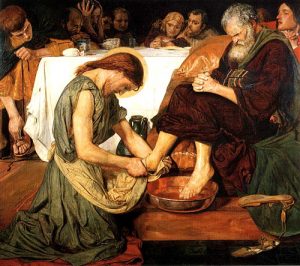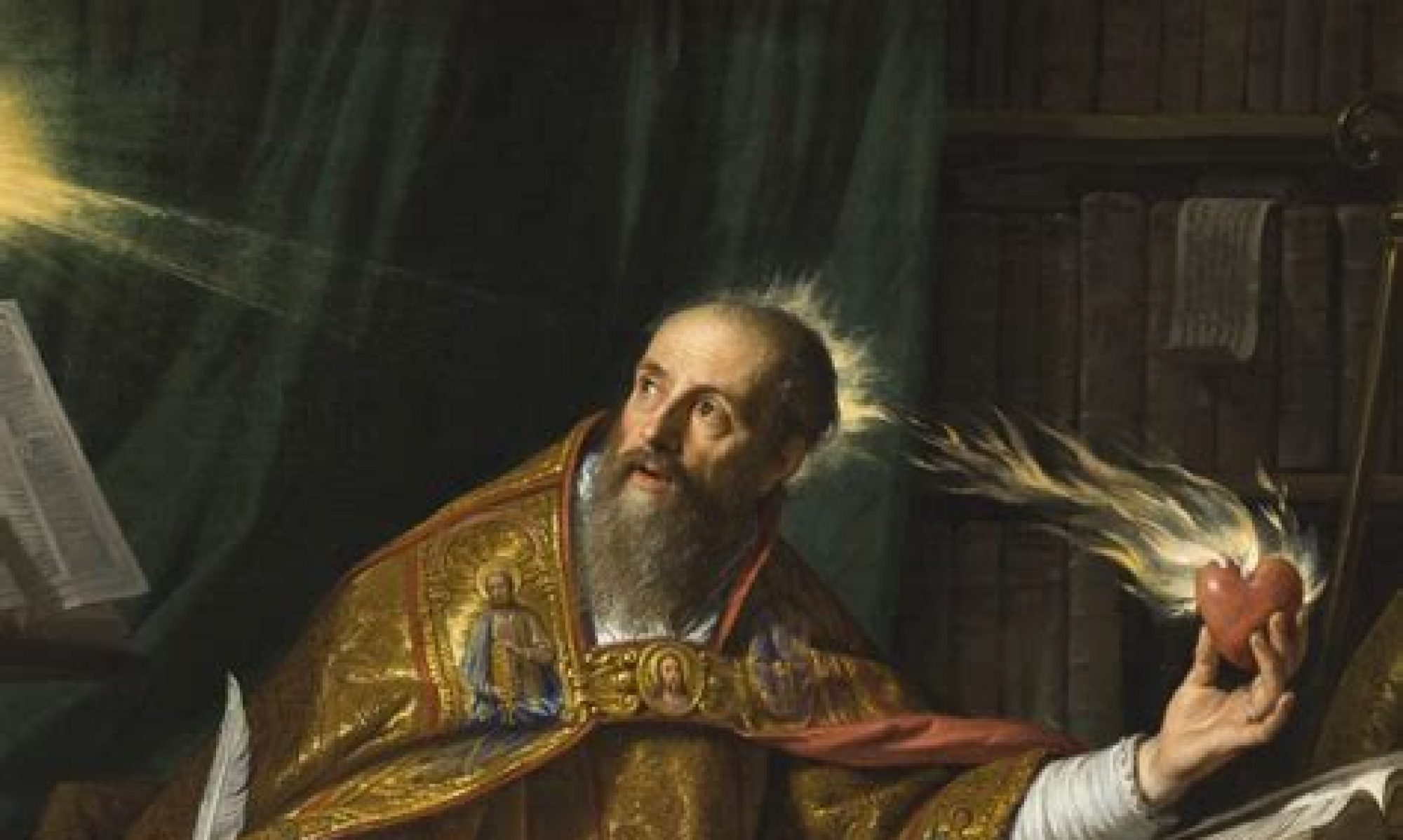Thank you for coming tonight. Today is called Maundy Thursday. What does it mean? Maundy is a word derived from the Latin word “mandatum” or “command”. It is a command coming from Jesus to His disciples, and it is a command to love and to serve!
The epistle today, taken from the first letter to the Corinthians 11:20-32, also describes this sacred ordinance or command. St. Paul teaches that what is eaten is called bread, though at the same time it is said to be the body of the Lord. These inspiring words are to attest that the outward signs signify that it is the real body and blood, broken and shed for us which flow from His death and sacrifice. Therefore, those who partake of it are called to accept Him as Lord and to live with Him as the very source and giver of Life.
In one of the interesting liturgies today, we find how meaningful the washing of the feet is. The Jewish custom of hospitality is to offer guests the opportunity to wash their feet before proceeding to the main house. Here, we find Jesus as the main host of that event at the Last Supper. It was unheard of that a master would wash the feet of His disciples, or that one with superior status would wash the feet of one who was inferior. This explains the astonishment of Peter and the disciples when Jesus removed his robe, donned a towel, and knelt down to wash their feet (verses 4-5). Everything pointed to a role reversal, a master becoming a servant. So, Jesus the Master, the Son of God, shows an act of His humility becoming the servant of all. After He washed their feet, Jesus told them to go and do likewise. This is an important reminder. Jesus says: Love one another just as I have loved you! In the same manner, serve one another as I have served you. We are commanded to do the same today.
According to the gospel reading, Jesus washing his disciplines’ feet before the meal was already in progress knowing that He was to fulfill His Father’s will. Jesus set an example and taught His disciples an act of humility and service. We are being reminded to do the same, to love, and to have a respectful encounter.
Our Holy Spirit community has to live that mission through acts of kindness, to bring healing, hope, and light to the darkness. I am humbled to be doing the washing of the feet of others. I believe this is an opportunity to rethink how we engage in service and in acts of humility, and how we continue to build and share our faith in an ever-changing climate. It has shed light on the act of intentionality and consciousness. Let us be intentionally mindful about how we value human friendship, connection and collaboration and be grateful for those blessings we have received. Jesus showed His disciples what it meant to be Christian. In these difficult times, we must continue to wash the feet of others and show the world what it means for the Word, Jesus, to become flesh.
In the scriptural texts, the duty of those who come to the Lord’s table must do a self-examination which is necessary to enter into the Sacrament of the Holy Eucharist. If we thoroughly search within ourselves, and fix what we find wrong, we should stop our negativities with a caution against the irregularities of which the Corinthians, like us, were guilty at the Lord’s table of sacrilegious acts. . Let us all come together to God’s worship, so as to enjoy the bounty of God’s presence.
God bless you.
Fr. Arlon, osa
—————————-
El Dictado del Corazón
Jueves Santo, Forma Extraordinaria (TLM)
- 1 Corintios 11:20-32
- Juan 13:1-15
Gracias por venir esta noche. Hoy se llama Jueves Santo. ¿Qué significa? “Maundy” es una palabra derivada de la palabra en latin “mandatum” o “comando”. ¡Es un mandato que viene de Jesús a sus discípulos, y es un mandato de amar y servir!
La epístola de hoy, tomada de la primera carta a Corintios 11:20-32, también describe esta ordenanza o mandato sagrado. San Pablo enseña que lo que se come se llama pan, aunque, al mismo tiempo, se dice que es el cuerpo del Señor. Estas palabras inspiradoras son para atestiguar que las señales externas significan que en realidad son el cuerpo y la sangre, rotos y derramados por nosotros, los que fluyen de Su muerte y sacrificio. Por lo tanto, quienes participan de él están llamados a aceptarlo como Señor ya vivir con Él como la fuente misma y el dador de Vida.
Escuchamos en las liturgias de hoy, cuán significativo es el lavatorio de los pies. La costumbre judía de la hospitalidad es ofrecer a los invitados la oportunidad de lavarse los pies antes de dirigirse a la casa principal. Aquí, encontramos a Jesús como el anfitrión principal de ese evento en la Última Cena. Era inaudito que un maestro lavara los pies de Sus discípulos, o que alguien con un estatus superior lavara los pies de uno que era inferior. Esto explica el asombro de Pedro y los discípulos cuando Jesús se quitó la túnica, se puso una toalla y se arrodilló para lavarles los pies (versículos 4-5). Todo apuntaba a un cambio de roles, un amo que se convertía en sirviente. Así, Jesús el Maestro, el Hijo de Dios, muestra un acto de su humildad haciéndose servidor de todos. Después de lavarles los pies, Jesús les dijo que fueran y hicieran lo mismo. Este es un recordatorio importante. Jesús dice: ¡Amaos unos a otros como yo os he amado! De la misma manera servíos unos a otros como yo os he servido. Se nos ordena hacer lo mismo hoy.
Según el evangelio, Jesús lavando los pies de sus disciplinados antes de la comida ya estaba en progreso sabiendo que iba a cumplir la voluntad de Su Padre. Jesús dio ejemplo y enseñó a sus discípulos un acto de humildad y servicio. Se nos recuerda que debemos hacer lo mismo, amar y tener un encuentro respetuoso.
Nuestra comunidad del Espíritu Santo tiene que vivir esa misión a través de actos de bondad, para traer sanidad, esperanza y luz a la oscuridad. Me siento honrado de tener la oportunidad de hoy, también yo, ser el servidor y poder lavar los pies a los demás. Creo que esta es una oportunidad para repensar cómo nos involucramos en el servicio y en actos de humildad, y cómo continuamos construyendo y compartiendo nuestra fe en un clima en constante cambio. Ha arrojado luz sobre el acto de la intencionalidad y la conciencia. Seamos intencionalmente conscientes de cómo valoramos la amistad humana, la conexión y la colaboración y estemos agradecidos por las bendiciones que hemos recibido. Jesús mostró a sus discípulos lo que significaba ser cristiano. En estos tiempos difíciles, debemos seguir lavando los pies de los demás y mostrar al mundo lo que significa que la Palabra, Jesús, se haga carne.
En los textos de las Escrituras, el deber de quien se acerca a la mesa del Señor debe hacer un autoexamen que es necesario para entrar en el Sacramento de la Sagrada Eucaristía. Si escudriñamos a fondo dentro de nosotros mismos y arreglamos lo que encontramos mal, debemos detener nuestras negatividades con una cautela contra las irregularidades de las que los corintios, como nosotros, éramos culpables en la mesa del Señor de actos sacrílegos… Reunámonos todos para la adoración de Dios, para disfrutar de la generosidad de la presencia de Dios.
Dios los bendiga.
Padre Arlón, osa

